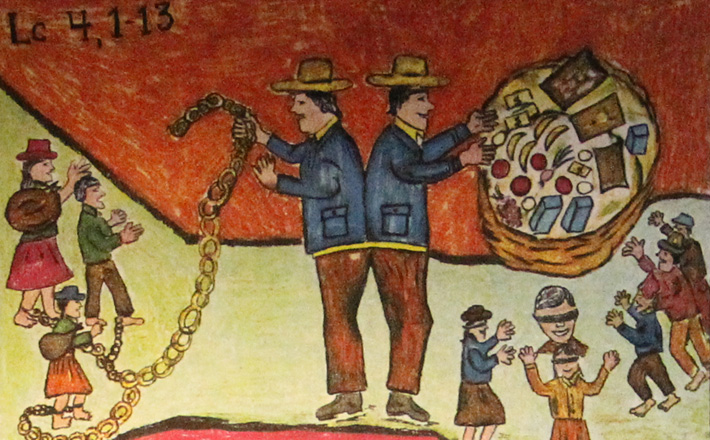Commentary on Deuteronomy 26:1-11
The text for this week comes at the end of a well-fashioned legal corpus in Deuteronomy (chapters 12-26).
The opening lines of this collection (12:1-7) are an injunction for the community to demolish all the high places where other nations have worshiped their gods, and instead, they are enjoined to “seek the place that the LORD your God will choose out of all of your tribes as his habitation to put his name there.” Moreover, they are instructed to bring their offerings to that place “in the presence of the LORD your God.” The opening lines of chapter 12, then, are about worship; worship that is undefiled and fully enshrouded in the presence of God. What follows in the collection is a lengthy list of case laws addressing a wide range of topics. The collection then closes with the text at hand.
Deuteronomy 26 resembles the opening lines of the collection in that it returns to the themes of worship and sacrifice. Those who consider this entire collection as a legal corpus without recognizing the liturgical elements present in both the beginning and the ending of the collection fail to appreciate the theologically formative nature of the collection. The statutes and ordinances announced in 12:1 and that appear throughout the collection are understood only as one understands the liturgical context in which these statutes are embedded. Theology, liturgy, ethics, and hope are tightly woven together throughout this collection and the final chapter serves as a culminating reflection.
Chapter 12 was addressed to the community. The verbs are in the plural, and together, the people are called to this new commitment of worship and shared life together. In chapter 26, however, the writer has shifted to singular verbs. The shift, no doubt, goes unnoticed in English translations, but in Hebrew all of the verb forms and personal pronouns have shifted to the singular in chapter 26. This morphological observation may seem irrelevant and without significant import, but perhaps more is intended.
The liturgy and confession explained in 26:1-11 hold in tension this oscillation between the individual and the community. The language and verbiage found therein suggest that even as each individual makes his or her own way to worship, the journey and the experience are enwrapped in the story of the community, even as the experience is enshrouded in the presence of God. The call for each individual to act, for each individual to participate in this liturgy of affirmation and hope, offers words of instruction for communities of faith who read this text today.
The liturgy and confession are grounded in a spirit of gratitude. Seven times in these eleven verses the author uses the word “to give” (nātan). In the first three usages (verses 1, 2, 3), the verb refers to God’s giving of the land and the final three (verses 9, 10, 11) likewise refer to the good gifts provided by God. In the opening lines, the author asks that the individual recognize all that has been given by God, while the final verse suggests that such gratitude is expressed appropriately when it is done so in community. The individual act then becomes enmeshed with corporate life thereby shaping the life of the community.
The seventh use of the verb “to give” occurs in verse 6. The text reads, “When the Egyptians treated us harshly and afflicted us, by imposing (nātan) hard labor on us.” In the six other usages, Yahweh is clearly the subject of the verb, yet in verse 6, the subject changes. Israel remains the recipient, but it is Egypt who carries out the action. Instead of land, Egypt “gives” Israel hard labor and oppression.
These two very different uses of the word “give” provide, in some ways, a nuanced understanding of gratitude. The gratitude for the land being given by Yahweh can never be understood apart from the hard labor exacted upon or “given” to the entire community. The One who delivered them out of Egypt with a “mighty arm” is the same One who has delivered them safely into the land (26:1). The produce harvested and brought as first fruits is never offered apart from the remembrance of deliverance.
Simply put, gratitude is rarely confined to the present moment. More often than not the present moment is the culmination of “givings” all along the way–sometimes being delivered to something and sometimes from something. The entire confession found in verses 5-10 seems to root the fruitfulness of the present with the faithfulness of God all along. As we read this text, we are asked to do no less. We likewise are to celebrate the richness of the present moment, while recalling that we are part of a community that has basked in the faithfulness of God all along. And yet for such celebration to remain individualized is to miss the power of story, our story–our shared story. The individualized gift of gratitude is only properly understood when rooted in the life of his or her community. And gratitude only finally reaches its proper end when it manifests itself within the life of the community.


February 21, 2010